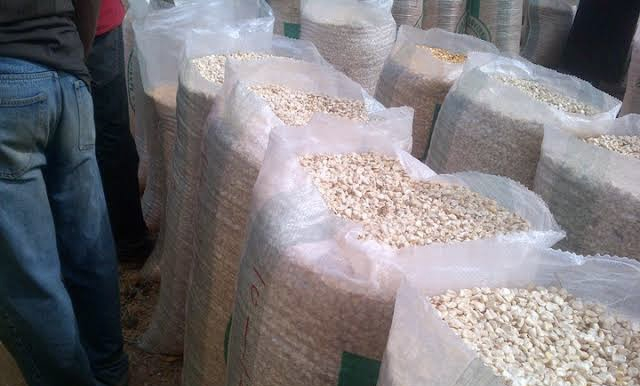November 28, 2025 | 04:20 GMT +7
November 28, 2025 | 04:20 GMT +7
Hotline: 0913.378.918
November 28, 2025 | 04:20 GMT +7
Hotline: 0913.378.918

Sack of maize used to illustrate the story.
The National Biosafety Management Agency (NBMA) has assured Nigerians of their safety when consuming TELA maize.
NBMA’s spokeswoman Gloria Ogbaki said this in a statement on Monday.
NBMA said the agency had been alerted to Nigerians’ concerns about the approval and launch of TELA maize in the country.
“NBMA wishes to state that the safety and health of Nigerians are of topmost importance, we will not compromise on this. We take into serious cognisance the concerns of Nigerians because maize is a staple crop which is of great importance to the country.
“NBMA is committed to ensuring transparency, safety and unbiased decision-making concerning genetically modified organisms,” she said.
Ms Ogbaki said that the agency conducted a proper risk assessment and analysis of TELA maize to ensure it was safe for human consumption.
She said that experts and scientists from academia and other relevant agencies thoroughly conducted the risk assessment for TELA maize.
The NBMA spokeswoman said that experts from the National Agency for Food and Drug Administration and Control, Standards Organisation of Nigeria, and Nigerian Agricultural Quarantine Service participated in the certification process.
She further listed the Federal Competition and Consumer Protection Commission, National Agricultural Seed Council and some university research centres as part of the process.
“They worked with our internal review process and confirmed that TELA maize meets safety standards. We urge Nigerians to remain calm and trust in the rigorous evaluation process. TELA maize has been approved based on scientific evidence. Its benefits to farmers are significant,” she said.
(Gazettengr)

(VAN) A new study reveals how the simultaneous effects of ocean acidification, salinity and loss of oxygen are making the world more fragile.

(VAN) Hopes are growing that the creation of the first 3D turkey gut model could be a turning point in the battle against the virulent blackhead disease.

(VAN) Tyson, America’s biggest meat supplier, plans to shutter one of its largest beef processing plants as the industry continues to struggle with low cattle supplies and political pressure from Washington.

(VAN) New FAO study shows how digital solutions are empowering farmers and fishers to prevent losses and build resilient agrifood systems.

(VAN) Brazil's COP30 presidency pushed through a compromise climate deal on Saturday that would boost finance for poor nations coping with global warming but that omitted any mention of the fossil fuels driving it.

(VAN) Poultry farmers in the UK have been warned that they could face one of the worst winters yet for bird flu.

(VAN) Prices of main-crop paddy have risen sharply, with jasmine rice hitting 16,100 baht per tonne — the highest level in years.